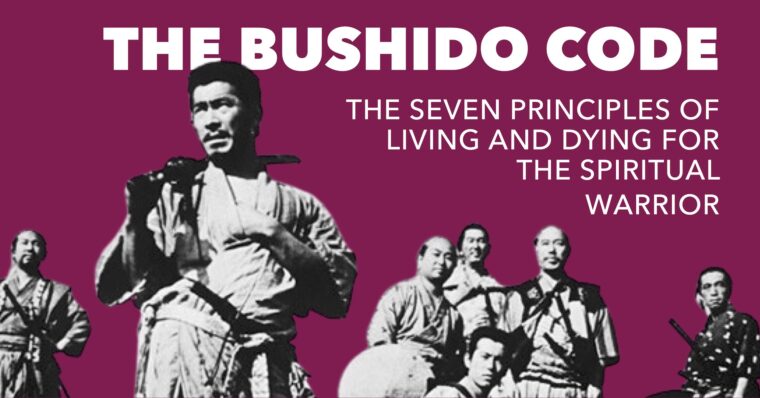A Spiritual Warrior is a man or woman who organizes their lives around a set of universal principles. They walk a higher path of physical, mental, emotional, and spiritual discipline. This means that every step on this path is a step of self-awareness and self-realization. With an unwavering commitment to universal principles, every relative contradiction, incongruence, and conflict in their life then becomes the territory their path leads them through. By committing to these universal principles, the relative parts of themselves are challenged to grow. These challenges become the practice that leads them forward on the path.

Throughout history, warrior cultures elevated brute fighting to a higher spiritual path. This created warrior classes who lived by higher ethical codes. No culture exemplified this more than the Samurai of Japan. They lived and died by the “Bushido Code”. The Way Of The Spiritual Warrior.
The Samurai of medieval Japan walked a higher path of physical, emotional, mental, and spiritual discipline. With unwavering commitment, these Spiritual Warriors saw every step on their higher path as a step of self-realization. They strove to be the very embodiment of the Bushido Code – “The 7 Principles Of The Spiritual Warrior.”
THE BUSHIDŌ CODE: 7 PRINCIPLES OF LIVING AND DYING FOR THE JAPANESE SAMURAI
- Righteousness (義 gi): Justice is the primary virtue for the Samurai. Living their lives committed to serving the greater good, Samurai would only wield their power in the name of moral justice.
- Loyalty (忠義 chūgi): The Samurai’s loyalty is first and foremost to the greater good. From this, all other loyalties flow – to their family, to their fellow warriors, to society, to their master or lord.
- Honor (名誉 meiyo): A Samurai is accountable for their actions and speech. They guard themselves against any transgressions in word or deed that would bring them, or their clan dishonor. Should they transgress in any way, they strove to make amends.
- Respect (礼 rei): For a Samurai the highest respect is to the Bushido Code. From there, respect extends to family, clan, their lord, and even to adversaries. In both gain and loss, a Samurai shows respect to all people.
- Honesty ( 誠 sei): A Samurai strives to be forthright, straightforward, and true. Vigilant to stay pure in their speech, they strive to never speak falsely, or misrepresent the truth. Honest and intentional in their speech, the Samurai communicate only when deemed appropriate, or beneficial.
- Courage (勇 yū): A Samurai’s courage lies in their unwavering commitment to serve to the greater good. Not controlled by their own fear, they are always ready to courageously sacrifice themselves for the greater good in every encounter. Even in the face of their own death.
- Sincerity (誠 makoto ): A Samurai is devoted to a higher path of service. Total surrender to this higher path allows them to be true to themselves at all times, in all places, and through all circumstances. Sincerity allows the Spiritual Warrior to be authentic and straightforward in their relations with others
In conclusion, the Bushido code was considered by the Samurai to be the highest standard of being human. Putting the Bushido code foremost in their lives allowed the Samurai to commit to deep service of the greater Goodness, Truth, and Beauty… without regard for themselves. This is the Samurai’s way… and it is the way of the Spiritual Warrior.


![THE BUDDHA’S ADVICE TO AN AIKIDO SENSEI [ENCORE POST]](https://theintegraldojo.com/wp-content/uploads/2017/08/BuddhasAdviceToAnAikidoSensei-150x150.jpg)

![[Encore Post] The Aikido Koan](https://theintegraldojo.com/wp-content/uploads/2018/03/TheAikidoKoan-150x150.jpg)

Please note: I reserve the right to delete comments that are offensive or off-topic.